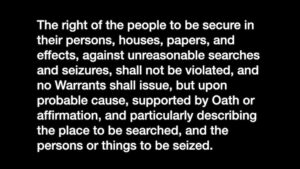Can You Claim a Reasonable Expectation of Privacy as a Guest If You Killed Your Hosts?

Not successfully.
The phrase reasonable expectation of privacy" signals that we're talking about the Fourth Amendment. That's the one that protects against unreasonable searches and seizures, meaning the government has to either get a warrant or show that one of the exceptions to the warrant requirement applies. There are, arguably, kind of a lot of exceptions. Cf. Majority Rejects Mullet Doctrine' In Fourth Amendment Case" (July 13, 2018). But the exceptions aren't the issue here. The issue here is when a defendant can raise the Fourth Amendment defense at all.
That is only possible if the defendant had a reasonable expectation of privacy" in the thing that was searched. For example, if the thing that was searched was your pants, the Fourth Amendment probably applies (unless maybe you're on parole and thus always subject to searches). If it was someone elses pants, probably not. People v. Burns, 196 Cal. App. 3d 1440 (1987). Same for the trash bag you set out on the curb, just FYI. California v. Greenwood, 486 U.S. 35 (1988).
You do, of course, have a reasonable expectation of privacy in your own home. But the Supreme Court has also held that a guest may have a reasonable expectation of privacy in their host's home. Minnesota v. Olson, 495 U.S. 91 (1990). Staying overnight in another's home is a longstanding social custom that serves functions recognized as valuable by society," the Court wrote in Olson, and it is reasonable for the guest to expect privacy there even though they do not have legal authority over the premises.
Murdering your host, though, is arguably a breach of this longstanding social custom. But does the murder mean that the guest has forfeited the reasonable expectation of privacy he or she previously had?
Well ... yes. Yes it does.
Or at least that was the holding in Tennessee v. Guy, recently decided by Tennessee's Court of Criminal Appeals. While I am linking to the opinion, I strongly recommend that you not read it, because the underlying facts are completely horrific. How horrific? Well, I don't support the death penalty because I think it's clear that innocent people will be mistakenly executed if it exists. But after I read these facts I quit my job, registered a 501(c)(3) corporation called Please Kill Mr. Guy, Inc.," and embarked on a a massive lobbying campaign to make executions mandatory before I remembered I don't support the death penalty for that other good reason and asked for my job back. This guy might not end up rooming with Hitler, but if he does I'm not 100% sure who would get the top bunk. That's how bad it is. So I urge you not to read the opinion. (I'm being serious.)
All you really need to know is that he killed his parents for their life insurance money and then argued that the search of their house violated his Fourth Amendment rights.
The defendant was the son of the victims, but that alone isn't enough to establish a reasonable expectation of privacy. He had never actually lived in the home himself, and at the time he was a 28-year-old college student living more than 600 miles away. He therefore also argued he was protected as a guest. And the evidence was clear that he was, in fact, a guest-at least to begin with. But the state argued that this privileged status terminated" at the point when he killed his hosts, and the court agreed. We hold that by attacking and killing the victims upon whose permission he relied in claiming that he was an overnight guest, the defendant no longer had a reasonable expectation of privacy in the [victims'] residence that society is willing to recognize as reasonable at the time of the officers' entry into the residence." Seems solid to me. True, they had never actually revoked that permission, but then he didn't give them the chance.
Again, while I urge you not to read the opinion, pages 9 through 13 would inform you that among the evidence seized during the search of the home was a notebook that, in addition to a syllabus for the defendant's math class, contained extensive handwritten notes listing everything he was planning to do to commit and cover up the murder of his parents (get plastic sheeting for disposal process" being probably the least unpleasant) and a list of the assets he thought he would inherit as a result. I'm pretty sure we have covered why it's a bad idea to compile incriminating lists of this kind, but can't find anything directly on point. But cf. Author of How to Murder Your Husband' Convicted of Murdering Husband" (May 27, 2022); Rapper Who Rapped About Committing Fraud Arrested for Fraud" (Oct. 19, 2020); Guy With Murder Scene Tattooed on His Chest Was Convicted in 2011" (July 24, 2013). In any event, now you know that if you leave such a list in your victims' home, don't expect the Fourth Amendment to suppress it for you.







 Related Stories
Related Stories